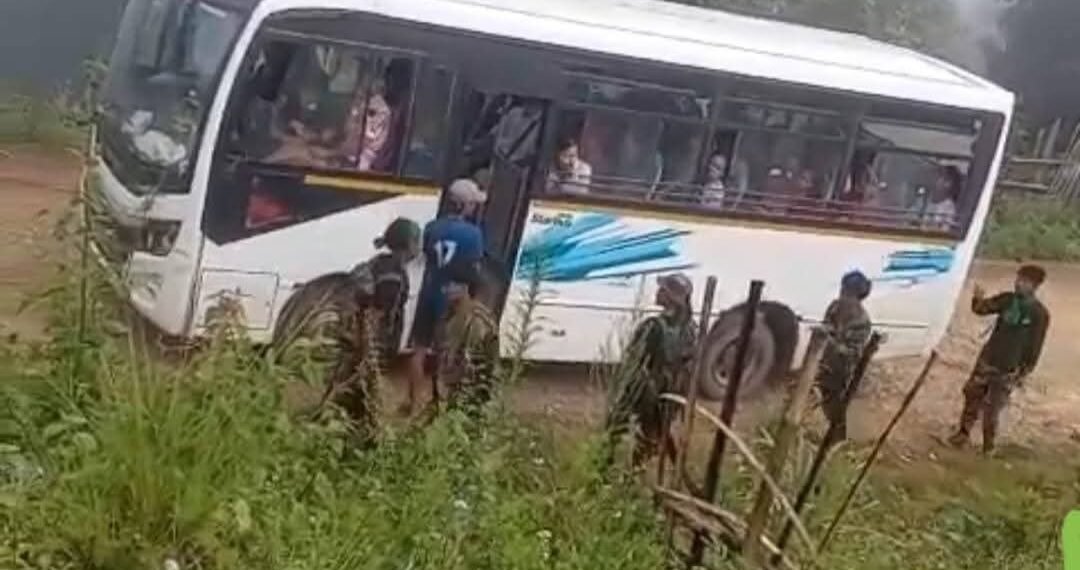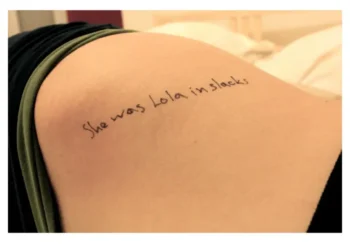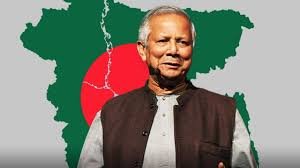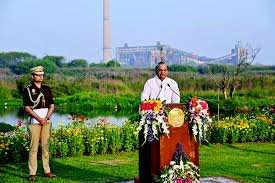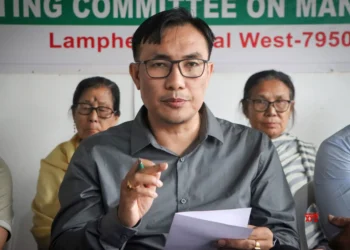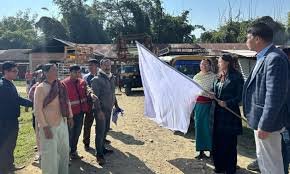Modi’s September 13 Manipur visit comes amid hype over a peace pact. On the ground, fear, mistrust, and buffer zones continue to define daily life and movement on Highways
BY Navin Upadhyay
September 9, 2025 – Five days after the Indian government, the Manipur administration, and key Kuki-Zo insurgent groups signed a revised Suspension of Operations (SoO) agreement—hailed by New Delhi as a “breakthrough” toward peace in the strife-torn state—little has shifted on the ground.
The tripartite pact, inked on September 4, extended the ceasefire with the Kuki National Organisation (KNO) and United People’s Front (UPF), promising non-violence, relocation of militant camps, and the reopening of National Highway-2 (NH-2) for free movement of goods and people. Yet reports from Manipur reveal a sharp disconnect between official optimism and deep-rooted distrust between the hill-dwelling Kuki-Zo tribal community and the Imphal Valley-based Meitei majority—fuelling fears that the agreement is little more than “a piece of paper” in a region scarred by two years of ethnic conflict.
The violence, which began on May 3, 2023, has claimed over 260 lives, displaced more than 60,000 people, and destroyed thousands of homes and religious sites. Buffer zones now divide the state, with Meiteis largely confined to the valley (about 10% of Manipur’s land) and Kuki-Zo and Naga tribes controlling the hills.
The Agreement and Its Limits
The SoO, first signed in 2008, lapsed in February 2024 amid heightened ethnic violence and tension. The Kuki-Zo Council (KZC), the apex civil society body of Kuki-zo community, had pledged to cooperate with central forces to ensure smooth movement on NH-2 — the vital Imphal–Dimapur highway. The highway was open for commercial vehicles and commuters other than Meiteis, who did not cross into the hills, just as the Kuki-Zo did not enter the valley. Yet five days after the signing, not a single Meitei is reported to have taken the highway to Dimapur across the Kuki-dominated Kangpokpi district. Kuki-Zo volunteers kept a close watch on all public transport passing through the stretch of road — for a Meitei to take a private vehicle like a car and drive through the area had been impossible even to imagine.
Fear prevailed: on September 8, armed Kuki militants had allegedly stopped a passenger bus at Molnom village, seizing phones after suspecting passengers of photographing a Kuki camp. Though the devices were later returned, viral footage of the incident, captioned “Free Movement at your own risk,” underscored the fragile ground reality.
Similarly, Kuki-Zo residents continued to avoid Imphal routes, travelling instead through Aizawl (Mizoram), Guwahati (Assam), or Dimapur (Nagaland) for flights and medical care.\
READ: Nepal Protesters Set Ablaze Parliament, Narayanhiti Museum, Palaces, and Homes
The agreement had achieved nothing on the ground in terms of ‘opening up’ the highway. The road was always open, and it remains so. But both communities dared not use it to enter each other’s areas — that was the reality then, and it is the reality now,” said an independent observer. “It only shows that coexistence between the two communities may no longer be achievable, even if the government were to sign any number of agreements with any number of groups in Manipur
Modi’s Visit and Political Optics
The pact’s timing—days before Prime Minister Narendra Modi’s anticipated September 13 visit, his first to Manipur since the crisis began—has drawn accusations of a “cosmetic attempt to buy time.” Modi is expected to deliver addresses at Kangla Fort in Imphal and Peace Ground in Churachandpur (a Kuki-majority district). Security has been tightened, curfews imposed, and beautification drives launched in anticipation of his three-hour stopover.
Kuki militants stopped a bus and seize phones in Ukhrul district, Manipur.
A passenger was suspected of taking photographs of a Kuki militant camp in Molnom.
Armed militants seized phones and inspected them for evidence of images or videos.
Source: Ukhrul Times pic.twitter.com/bEEjIsFfZz
— Pagan 🚩 (@paganhindu) September 9, 2025
Opposition parties, including Congress, dismissed the deal as “too little, too late.” Jairam Ramesh called it an “insult” to Manipur after 29 months of neglect.
Media Hype vs. Ground Skepticism
National media celebrated the pact as a “big leap toward normalcy,” highlighting NH-2’s reopening as “icing on the cake.” Political commentators framed it as a confidence-building step ahead of Modi’s trip. But analysts familiar with Manipur’s ethnic dynamics call it “planting seends oan on barren land.”
The SoO’s emphasis on territorial integrity and constitutional solutions directly clashes with Kuki-Zo demands for a separate Union Territory with legislature—escalating from earlier calls for autonomous councils. KNO/UPF clarified that future talks will center on this demand, accusing the Press Information Bureau of downplaying separatist aspirations.
Meitei groups like the Coordinating Committee on Manipur Integrity (COCOMI) have rejected the extension, terming it an “anti-people move” that legitimizes “narco-terrorist” outfits. They argue it undermines a 2023 cabinet resolution to abrogate the SoO and ignores evidence of Kuki militants’ role in the clashes.
This is a reminder to the community that dwells within 650 sqkms known as Manipur. When you burned down life-saving drugs and medical equipment meant for Kuki-Zo community, when you used the so-called Foothills Naga to block our connecting road, and when you used all your might… pic.twitter.com/fqcFeJVnPl
— The Proud Indian (@DynastyDoungel) September 8, 2025
Divisions persist within Kuki-Zo circles too. The Village Volunteers Coordination Committee (VVCC) condemned KZC’s unilateral NH-2 decision, insisting Meiteis should not enter Kuki areas until separate administration is granted. Thadou Inpi Manipur (TIM), representing a related subgroup, demanded the pact’s termination, citing unaddressed atrocities—including the recent killing of Thadou leader Nehkam Jomhao in Assam, allegedly by SoO cadres. Naga groups have also voiced anger, accusing camp relocations of encroaching on their lands.
READ: UKNA Forces Coffins’ Return in Churachandpur Before PM Visit
On social media, Kuki users dismiss the pact as meaningless without justice for past mob attacks in Imphal, while Meitei voices condemn it as a threat to Manipur’s integrity. Viral posts mock the “pesky peace” as performative ahead of Modi’s visit.
With buffer zones still “red lines” where lives are at risk, and vigilantes stoking hate on both sides, few see reason for optimism. While New Delhi touts hope, Manipur’s people remain divided by distrust.
The path to true normalcy requires far more than ink on paper—it demands inclusive dialogue, justice for victims, and governance that addresses grievances across communities to heal a fractured state.


